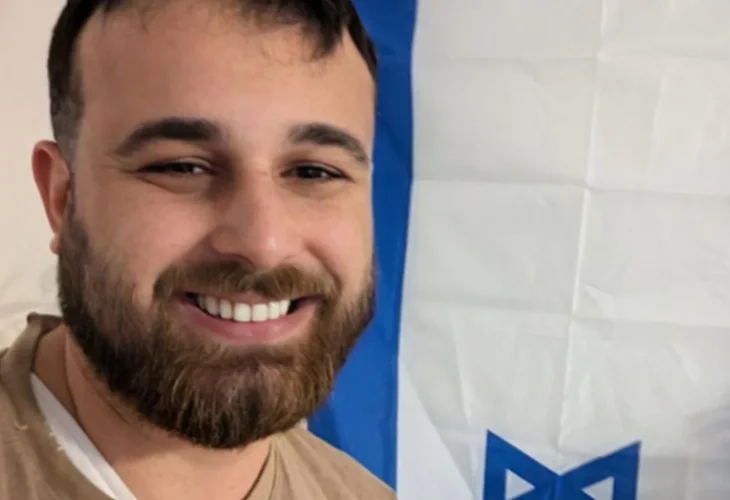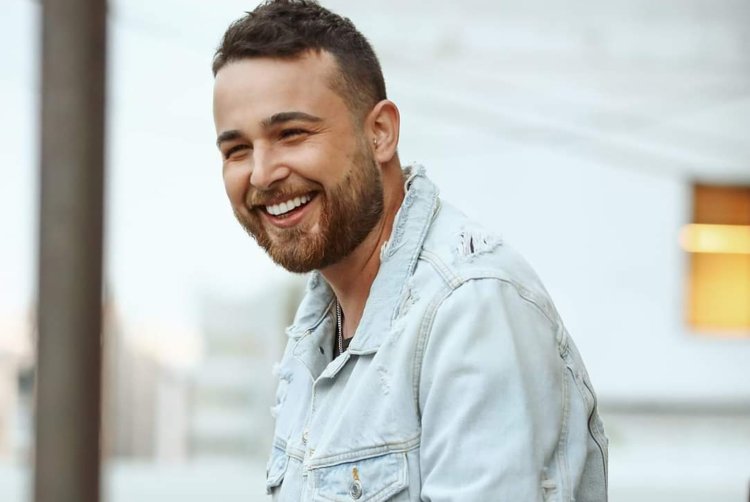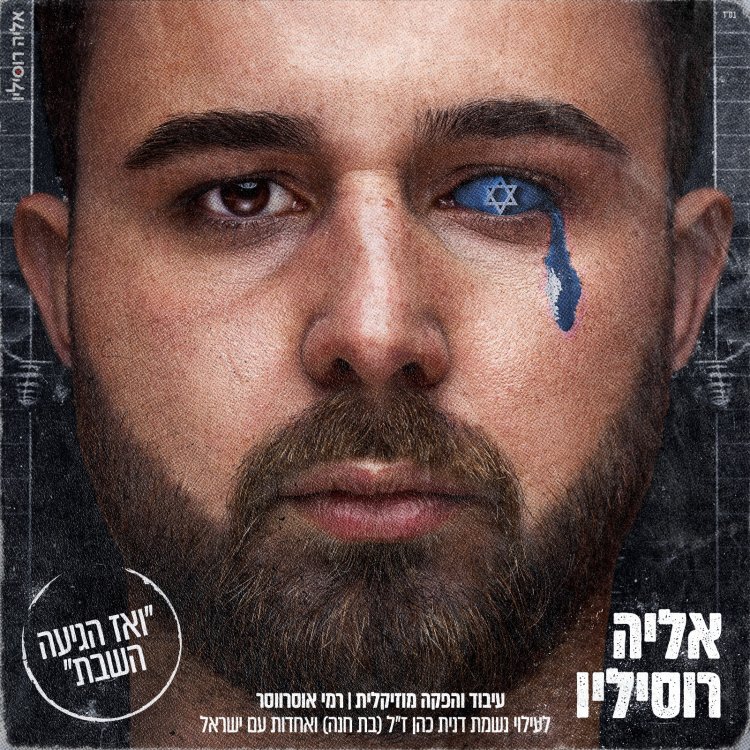From Turmoil to Melody: The Journey of Elia Rosilio
Elia Rosilio's life story defies the odds. Born to a family plagued by addiction and crime, he forged an impressive musical career and chose a path of Jewish faith and tradition.
 Elia Rosilio
Elia RosilioElia Rosilio, 30, a musician residing in Bnei Atarot, has an incredible and surprising life story. On numerous occasions, his life could have taken a negative or even destructive turn, but with tremendous help from above and remarkable personal effort, he achieved impressive success and gradually embraced a life of Torah and commandments.
"I was born in Haifa to a secular family, and both of my parents were addicts," he drops the bombshell right at the start of our conversation. "I am my parents' only child together, with four half-siblings, two from my mother and two from my father. Two of them lead normal lives, while the other two spent long years in prison for serious offenses.
"The memories I carry from my childhood are not simple. I remember, for instance, my older brother jumping on my father with a knife. I recall lots of drugs at home and many other challenging experiences. In recent years, I've asked my mother about some of these memories, and she confirmed their accuracy. My father passed away ten years ago, so I can no longer ask him.
"At the same time, there were also positive experiences at home, like on my fifth birthday when I came home to find my room filled with surprises. Even then, I realized it was unusual, unmatched by my friends' experiences. Years later, when I learned that my parents couldn't afford so many gifts, I asked my brother about it, and he told me everything was stolen. Yet, in the world I grew up in, the good and the bad were strongly mixed. Tithing (ma'aser) is something I never let go of, no matter what. I inherited that from my father, the matters of tithing and charity. No matter how little he had, he always gave."
As a child and later as a teen, do you remember wanting to choose a different life path than the one you stumbled upon?
"Yes, that thought definitely crossed my mind more than once. At five and a half, I moved with my father to a hostel in Be'er Sheva and soon after moved to live with my father's sister, Yaffa, and her husband Yossi. These people are angels on earth. They raised me for 21 years, and my debt to them is immeasurable. It's not that everything turned rosy once I moved in with them. As we know, children can be very cruel, and indeed they teased me about being adopted, saying things like 'I have a mom, and you don't,' and many times I broke down in tears."
Amidst all this, when and how did your connection to music start?
"From a young age, I watched music reality shows and fell in love with the world of music at first sight. I began writing songs in fourth grade, and when I showed them to people, they couldn't believe I wrote them. At 15, I saw someone playing guitar and was fascinated, so my uncles bought me a guitar, and some folks doing community service in our neighborhood taught me how to play. Shortly after, I joined a music program at school, kept writing songs, and started composing.
"After high school, I joined the Air Force, and during my service, I worked and volunteered. Around that time, I also received the Rishon LeZion award for social volunteering. At the same time, during my military service, I began performing small gigs with my music. During that period, I was also in touch with Stav Shamesh, a successful lyricist, and we collaborated. Eyal Golan already knew her, and when I sent him a song, he took it. I told him it was Stav's song, but I wrote the lyrics while she composed the melody."
 Elia Rosilio (Photo: Or Danon)
Elia Rosilio (Photo: Or Danon)"Success Brings Expectation and Responsibility"
Rosilio's career as a songwriter and composer began to gain momentum, but one song he co-wrote and composed with Stav Beger propelled it to the next level. "At some point, I met Stav Beger and immediately realized he was a talented and unique producer. I knew we had to work together, but our schedules never aligned. During that time, I worked as a waiter in a Tel Aviv restaurant. One day, people left the restaurant without paying, and the manager decided to fire me. As I left, I called Stav and suggested we meet, and this time it finally worked out. We started working, and after 40 minutes, the song 'Two Crazy People,' which was later given to Omer Adam, was finished in terms of lyrics and melody."
When a song you wrote blows up like that, it surely brings a lot of attention to the new discovery in the industry.
"Yes, that song really made a lot of noise and put the spotlight on me as a writer and composer. Many big artists are always searching for good songs, and if you know how to create them, you get a lot of attention. To this day, I've written for many well-known artists, including Ran Danker, Omer Adam, Shiri Maimon, Miri Mesika, Eyal Golan, Dudu Aharon, Nasreen, Rami Kleinstein, Liran Danino, Rotem Cohen, Harel Skaat, military bands, and more. But many times, they still ask me to bring another 'Two Crazy People' because it was such a huge hit. The thing is, that's not easy, and that song is not even in the style I usually write. The success of that song was joyful, but it also brought expectations and significant responsibility.
"After 'Two Crazy People,' I kept writing and composing, but at some point, I got bored because mainstream artists asked for things I didn't really connect with, and they didn't relate to the things I wrote. Many artists prefer not to sing about stuff that interests me, like the social situation in the country, the political climate, things related to the unity of the people of Israel, spiritual matters. So, at some point, I decided to sing my songs or release a project where singers would perform my songs, and thank Hashem, today my first album, called 'And Then Came Shabbat,' is being released. The album was beautifully produced by Rami Osrovaser, and it's dedicated to the memory of Danit Cohen hy"d, daughter of Hannah, who was murdered at the Orim base while performing her duty. Some of the songs on the album I sing myself, and some are sung by other artists. Yes, it's incredibly exciting."
"Hashem Has Always Been in My Heart"
In recent years, alongside impressive career progress, Rosilio has drawn closer to a life of Torah and mitzvot and nationalistic views, and openly and freely discusses this choice. "I came from a traditional home, and we would go to synagogue and have Shabbat meals, but I didn't like it. My aunt forced me in this regard, and it made me not connect with Shabbat. At some point, she explained that she did it to keep me off the streets, but for a child taking 40 mg of Ritalin a day, it wasn't simple. By the way, today Shabbat is a great source of joy for me. Shabbat is time for myself, a disconnection from draining things, time for connection with Hashem, which is the most important thing. I've made a great rectification with Shabbat, and I see it as a tremendous blessing.
"Naturally, when I reached an age where you can't force me, I stopped doing those things like going to synagogue, etc. However, Hashem has always been in my heart, and I've always maintained basic kashrut. In the past year, especially since Simchat Torah, when Hamas terrorists killed our brothers here just for being Jewish, I decided I want to live like a Jew should. Put on tzitzit, a kippah, pray, and other such things. I strive to observe everything I learn, and there are things I'm particularly connected to. For instance, blessings before and after meals are something I feel deeply about.
"This aspect received an additional push after I saw the 'Eretz Nehederet' skit with the knock on the door of a Haredi family, which was meant to show that Haredim don't die in the army. I felt it strongly resembled anti-Semitic skits. I have Haredi uncles who served in the army, and it made me want to go to the other side. I felt I needed to fight for Torah, for Judaism, and I try to do so on social media, even though it costs me. Due to things I post, people distance themselves from me and think I've gone crazy, but that won't stop me. I've faced very challenging financial difficulties because of this, and I've learned that nothing is taken for granted. Not even the food on my table."
As a new baal teshuva, what gives you the strength to fight these not-so-simple battles?
"I've learned a lot of history, and I know what happens when Torah disappears. What happens when people fight against it. I'm not forcing anyone to observe mitzvot, but I feel the need to show the beauty within Torah. Besides, I can't remain silent about what's being done to Haredim. I was in a business partnership for two years with one of the people funding Yair Lapid, and I know exactly what their agenda is. These are people explicitly fighting against Judaism. I observe from the sidelines and try to open people's eyes, to logically explain the importance of our heritage's continuity.
"And the truth is, many people try to hide positive and important things about our Torah and our rabbis. Most people, for instance, don't know that Rabbi Yehuda Alkalay envisioned the state before Herzl, and his contribution to the Jewish people is enormous. Before the secular Zionists, there were Torah people who were no less Zionistic. Left-wing protests claim 'we established the state,' but they forget religious and Haredi people were here before the secularists arrived. People who engaged in settling the land because it's Hashem's will. Righteous and God-fearing individuals who died from diseases and lived lives of poverty for the sake of the Land of Israel and the establishment of the state, but there are those who try to erase them.
"Thank God, besides those who oppose me, I also receive very encouraging feedback. People like Omer Adam, Yael Shelbia, and Miri Mesika view my stories. I know my stories impact people with a lot of influence, and many who see my activities online tell me they wish they had the courage to speak like me, even though they wish they could. I fight for Torah and pay a heavy price, but I definitely do not plan to stop."

In this regard, do you feel your strengthening in Torah observance affects your work as a songwriter?
"Certainly, it is very related. The things I learn and live eventually find their way into the songs I write because they are part of me. This isn't always overt, and I have yet to write a song where I speak directly to Hashem, as it feels incredibly personal, but it seeps in various ways. I feel that I am sanctifying God's name in my music and the things I write, and you can see it in the current album, especially in songs that talk about the importance of unity and tradition."

